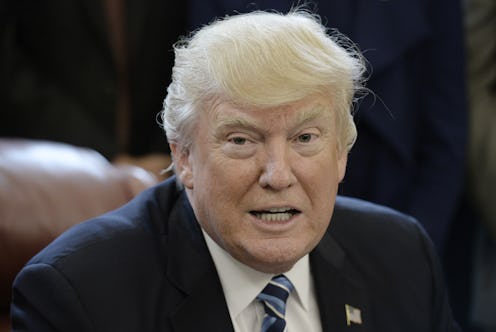News
Trump's Promise To Cut Taxes Might Be Broken

The Trump administration unveiled its tax plan on Wednesday — or rather, it released a one-page fact sheet explaining the "goals" of its tax plan, which hasn't yet been written. In the fact sheet, the administration promises to provide "needed tax relief for all Americans, especially the working poor and middle class." However, Trump's plan to cut middle-class taxes could raise them instead.
The administration outlined four goals of its tax plan, the first of which is "tax relief for middle class Americans." Apparently, though, the operative word is "goals." In an interview with George Stephanopoulos, Treasury Secretary Steve Mnuchin admitted that the tax plan might not actually cut taxes for the middle class. In fact, Mnuchin refused to guarantee that Trump wouldn't raise taxes on the middle class.
"Can you guarantee that no one in the middle class is going to pay more [under Trump's tax plan]?" Stephanopoulos asked on Thursday.
"That's our objective, absolutely," Mnuchin replied.
"Is it a guarantee?" Stephanopoulos pressed.
"Uhh, I can't make any guarantees until this thing is done and on the president's desk," Mnuchin said. "But I can tell you, that's our number-one objective in this."
In all fairness to Mnuchin, tax reform is incredibly complicated, and major bills always undergo significant changes and revisions as they make their way through Congress. At this stage in the process, nobody can say with certainty what the final piece of legislation might look like.
However, none of this is preventing the administration from making guarantees about what the legislation will and won't include. Trump has to sign any bill in order for it to become law, and he could easily announce, for instance, that he won't sign any bill that doesn't include middle-class tax cuts. And he could most definitely promise to veto any bill that raises taxes on the middle class. But he hasn't. Likewise, Mnuchin also refused to guarantee that Trump won't cut taxes for the rich, saying only that "we'll see where we get from here."
In totality, Mnuchin's comments suggest that Trump, at the end of the day, may just sign a garden-variety Republican tax bill — that is, one that cuts taxes for high-income earners and businesses while retaining or raising tax rates for middle- and low-income Americans. This is supply-side economics, and it's been the fundamental basis of the Republican Party's economic policy for the last three decades or so.
Trump has most definitely changed the GOP in some big ways. But so far, he's shown no intention of making the party's tax policies any less plutocratic and regressive as they've always been.